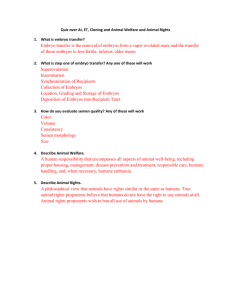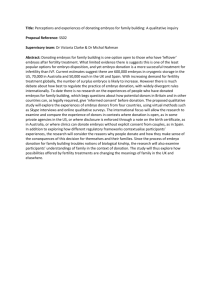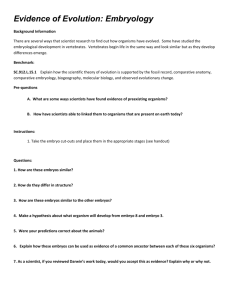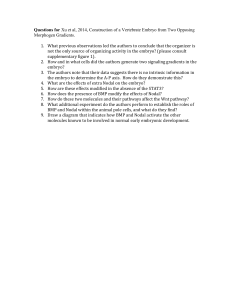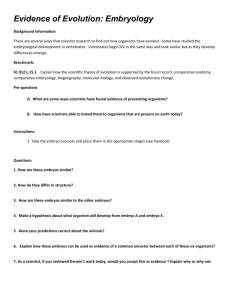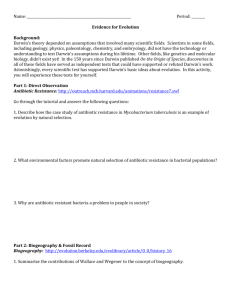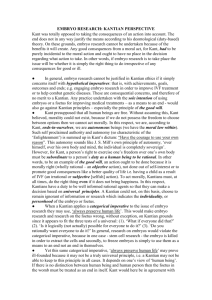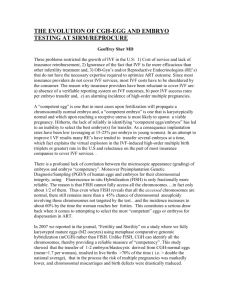AS RELIGION AND ETHICS:
advertisement
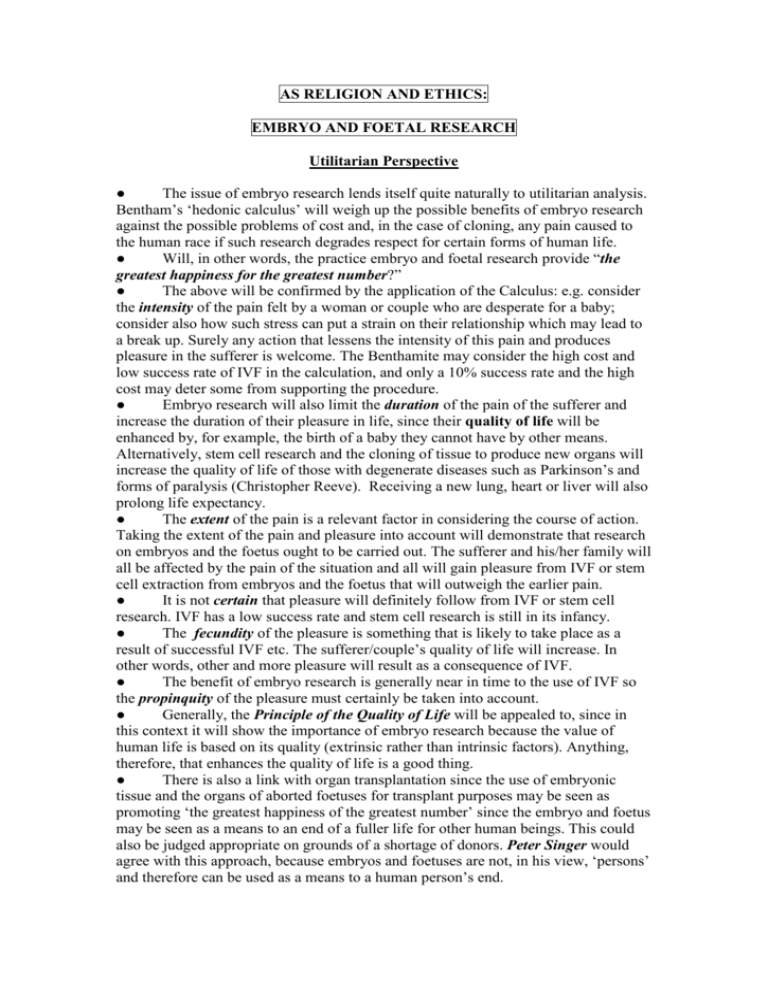
AS RELIGION AND ETHICS: EMBRYO AND FOETAL RESEARCH Utilitarian Perspective ● The issue of embryo research lends itself quite naturally to utilitarian analysis. Bentham’s ‘hedonic calculus’ will weigh up the possible benefits of embryo research against the possible problems of cost and, in the case of cloning, any pain caused to the human race if such research degrades respect for certain forms of human life. ● Will, in other words, the practice embryo and foetal research provide “the greatest happiness for the greatest number?” ● The above will be confirmed by the application of the Calculus: e.g. consider the intensity of the pain felt by a woman or couple who are desperate for a baby; consider also how such stress can put a strain on their relationship which may lead to a break up. Surely any action that lessens the intensity of this pain and produces pleasure in the sufferer is welcome. The Benthamite may consider the high cost and low success rate of IVF in the calculation, and only a 10% success rate and the high cost may deter some from supporting the procedure. ● Embryo research will also limit the duration of the pain of the sufferer and increase the duration of their pleasure in life, since their quality of life will be enhanced by, for example, the birth of a baby they cannot have by other means. Alternatively, stem cell research and the cloning of tissue to produce new organs will increase the quality of life of those with degenerate diseases such as Parkinson’s and forms of paralysis (Christopher Reeve). Receiving a new lung, heart or liver will also prolong life expectancy. ● The extent of the pain is a relevant factor in considering the course of action. Taking the extent of the pain and pleasure into account will demonstrate that research on embryos and the foetus ought to be carried out. The sufferer and his/her family will all be affected by the pain of the situation and all will gain pleasure from IVF or stem cell extraction from embryos and the foetus that will outweigh the earlier pain. ● It is not certain that pleasure will definitely follow from IVF or stem cell research. IVF has a low success rate and stem cell research is still in its infancy. ● The fecundity of the pleasure is something that is likely to take place as a result of successful IVF etc. The sufferer/couple’s quality of life will increase. In other words, other and more pleasure will result as a consequence of IVF. ● The benefit of embryo research is generally near in time to the use of IVF so the propinquity of the pleasure must certainly be taken into account. ● Generally, the Principle of the Quality of Life will be appealed to, since in this context it will show the importance of embryo research because the value of human life is based on its quality (extrinsic rather than intrinsic factors). Anything, therefore, that enhances the quality of life is a good thing. ● There is also a link with organ transplantation since the use of embryonic tissue and the organs of aborted foetuses for transplant purposes may be seen as promoting ‘the greatest happiness of the greatest number’ since the embryo and foetus may be seen as a means to an end of a fuller life for other human beings. This could also be judged appropriate on grounds of a shortage of donors. Peter Singer would agree with this approach, because embryos and foetuses are not, in his view, ‘persons’ and therefore can be used as a means to a human person’s end. Applying Mill to Embryo and Foetal Research ● The first thing to note is Mill’s principle of autonomy (self-determination): “Over himself, over his own body and mind, the individual is sovereign.” The essence of this principle is that there is no authority above your self when it comes to power over one’s own life. For the utilitarian God is not a part of the moral universe and so human beings are in authority and there is no higher authority to consult. The principle of autonomy is central to the issue of embryo research and, for Mill, autonomy is absolute. Therefore, if a person wants to donate their embryos or freeze embryos then they ought to be allowed to do so. Furthermore, engaging in research on a foetus is justified, especially if it is the result of an autonomous decision to abort the foetus. ● The next thing to consider is Mill’s distinction between higher and lower pleasures. In the case of embryo research, Mill’s distinction is highly relevant. In the first place, it is clear that ‘personhood’ and ‘higher pleasures’ are closely related. Mill would argue that an embryo and foetus are not persons and therefore cannot experience higher pleasures. Therefore, embryos and the foetus can be used as a means to an end. That bend is the benefits such research can bring to those capable of experiencing higher pleasures. Mill would also dismiss the argument about ‘potential’ i.e. that an embryo has the potential in the future to experience higher pleasures. Yet potential is not actual and therefore can be discounted. ● The next element of Mill’s theory to consider is his stress on the importance of internal sanctions. Bentham believed people acted morally because of ‘external sanctions’ which acted upon them as a restraining influence such as the law and public opinion. Mill, however, understood that people acted morally independently of such sanctions and instead acted out of conscience or guilt. Conscience and guilt have both a restraining influence and an ability to set the individual free to act against prevailing norms. In the case of embryo research a person may think it their duty to donate eggs/sperm for those who want a baby etc as an exercise of their conscience and not only as an expression of their autonomy. In contrast, a doctor or family member may believe it wrong on the grounds of conscience to practise embryo research just so that another person will benefit from IVF or stem cell research. In this respect, conscience may be used as a ‘rule’ which could override the idea that embryos or the foetus – here understood as individual human beings - can be used as a ‘means to an end’.
